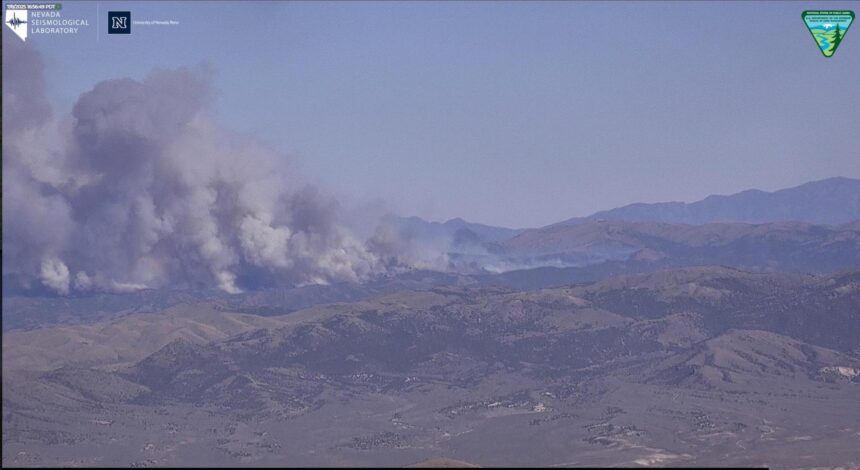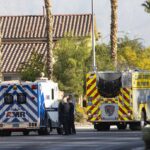A massive wildfire known as the Gothic Fire has scorched approximately 35,000 acres within the Nevada Test and Training Range, prompting authorities to close the area to the public. The blaze, which ignited earlier this week, has raised concerns about environmental damage and safety risks, leading officials to implement strict access restrictions while firefighting efforts continue.This article provides the latest updates on the fire’s progression, containment measures, and the impact on military operations and surrounding communities.
Gothic Fire Rapidly Consumes 35,000 Acres on Nevada Test and Training Range
The Gothic Fire has aggressively expanded across the Nevada Test and Training Range, consuming an estimated 35,000 acres of terrain. Firefighting teams continue to battle unpredictable winds and dry conditions that have fueled the blaze. As a precaution, authorities have enforced strict restrictions, declaring the entire site off-limits to the public to ensure safety and allow emergency personnel to focus on containment efforts.
Current impacts of the fire include:
- Restricted airspace: Military and civilian flights rerouted around the affected zone
- Evacuations: Nearby personnel and contractors relocated to safe areas
- Resource deployment: Increased number of ground crews and aerial support
| Aspect | Status |
|---|---|
| Acreage Burned | 35,000+ acres |
| Containment | Ongoing, < 30% |
| Access | Closed to Public |
| Emergency Response | High Priority – Active |
Emergency Response Efforts and Fire Containment Strategies Underway
Firefighting teams have mobilized rapidly to combat the extensive blaze now engulfing 35,000 acres within the Nevada Test and Training Range. Ground crews,air tankers,and helicopter units are working in concert to establish containment lines,utilizing controlled burns and deploying fire retardants to curb the fire’s spread. Efforts are being continually adjusted based on weather patterns and topography, aiming to protect critical infrastructure and preserve unaffected areas of the range.
Key strategies being employed include:
- Establishment of perimeter containment lines with the aid of bulldozers and hand crews
- Aerial water drops and fire retardant applications to slow the fire’s progress
- Continuous monitoring of wind shifts to anticipate potential flare-ups
- Coordination with local authorities to maintain public safety and manage restricted access zones
| Resource Type | Units Deployed | Status |
|---|---|---|
| Ground Crews | 150 | Active |
| Air Tankers | 4 | Operational |
| Helicopters | 3 | On Patrol |
| Bulldozers | 2 | Engaged |
Environmental Impact and Risks to Local Wildlife Ecosystems
The recent wildfire has inflicted meaningful damage on the fragile ecosystems within the Nevada Test and Training Range. The blaze’s rapid spread across 35,000 acres has disrupted habitats, threatening the survival of numerous native species. Many animals, including small mammals, reptiles, and ground-nesting birds, faced immediate displacement or fatal consequences due to the loss of shelter and food sources. Fire-altered landscapes also lead to increased soil erosion and water runoff, which can further degrade the quality of local waterways and aquatic habitats.
- Habitat Loss: Immediate destruction of vegetation crucial for shelter and foraging.
- Disruption of Food Chains: Reduced prey availability impacting predators and overall biodiversity.
- Soil Degradation: Increased erosion affecting plant regrowth and water quality.
| Species | Pre-Fire Population | Estimated Impact |
|---|---|---|
| Desert Tortoise | Approx. 1,200 | Severe Habitat Reduction |
| Greater Sage-Grouse | Approx. 3,500 | Lost Nesting Areas |
| Mule Deer | Approx. 800 | Displacement from Feeding Grounds |
The ecological repercussions extend beyond the immediate fire zone. The loss of native plant species can pave the way for invasive plants to colonize, further altering the ecosystem balance. Recovery efforts will require long-term environmental monitoring and intervention to restore natural conditions. Wildlife corridors and protected areas will be critical to facilitating species movement and repopulation. In addition,the restricted access to the area delays vital biological assessments,complicating efforts to understand the full extent of the damage and hindering timely conservation responses.
- Invasive Species Threats: Altered fire-disturbed landscapes favor non-native flora.
- Restoration Challenges: Delayed access impedes habitat rehabilitation and research.
- Long-term Monitoring: Essential to track recovery and prevent further ecosystem degradation.
Public Safety Measures Enforced as Access to Site Remains Restricted
Authorities have implemented stringent safety protocols to ensure the well-being of nearby communities as the Gothic Fire continues to burn across the Nevada Test and Training Range. Access to the affected area remains strictly prohibited, with military and firefighting personnel coordinating efforts to monitor fire activity and prevent further spread. Residents and visitors are urged to comply with all restrictions and stay updated through official channels to avoid potential hazards.
Among the key public safety measures in effect:
- Continuous air quality monitoring to track smoke and pollutant levels.
- Establishment of perimeter checkpoints staffed by security forces to enforce site restrictions.
- Real-time updates via emergency alert systems to inform the public of any changes in fire behavior or evacuation orders.
- Coordination between local, state, and federal agencies ensuring rapid response and resource allocation.
| Safety Measure | Status |
|---|---|
| Site Access | Restricted |
| Air Quality Monitoring | Active |
| Evacuation Plans | On Standby |
| Emergency Alerts | Operational |
Concluding Remarks
The Gothic Fire on the Nevada Test and Training Range has scorched approximately 35,000 acres, prompting authorities to close the site to the public as firefighting efforts continue. Officials urge residents and visitors to stay clear of the area to ensure safety and allow emergency personnel to operate without obstruction. Updates will be provided as the situation develops.








